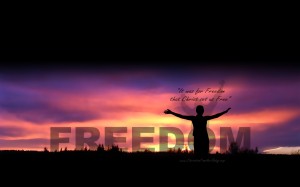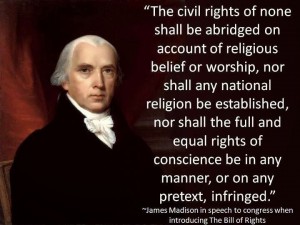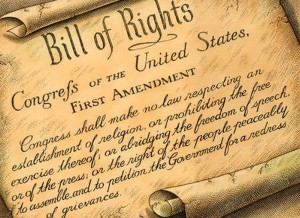It is our duty.
This weekend, even as we celebrate and commemorate the anniversary of the American experience in the cause of freedom and liberty, we find ourselves floundering as a nation, confounded and confused by who and what we are as a people, and bewildered by ever expanding societal divisions and cultural differences. We find ourselves no longer a melting pot, no longer living as “One Nation under God, indivisible, with liberty and justice for all” but rather a divided and polarized people who no longer remember why freedom and liberty are matters of great and serious import.

Religious Freedom
At his trial, Jesus responded to Pilate’s inquiry as to whether he was a king by stating “For this I was born and for this I came into the world, to testify to the truth. Everyone who belongs to the truth listens to my voice.” And Pilate then asked that most provocative and fundamental question, “What is truth?”[1]
It is equally telling and personally pertinent for those of us who hold dear our freedoms, and most importantly religious freedom, to hear the first seven words of the second sentence of the Declaration of Independence, “We hold these truths to be self-evident…”
Today, especially in the arena of public discourse, objective truth has been tried, convicted and sentenced to the subjective confines of “sincere belief;” what we “sincerely believe” has been declared and adjudicated as “the truth”, both de facto and de jure, without any acknowledgement, consideration, or reasoned knowledge of the facts, especially when it pertains to either moral or natural law. “I believe, therefore it must be true” has become the argument du jure and it is and it may ultimately prove to be the catalyst behind the disintegration and demise of religious freedom within this great nation.
Earnest people, working diligently for the cause of religious freedom have quite unfortunately and mistakenly been at the epicenter of an unintended paradigm shift with claims that their “sincerely held beliefs” have been infringed; the most recent example coming from the Green family in the Hobby Lobby case recently decided before the Supreme Court. All that they have accomplished is to codify the legal argument first warned about by John Courtney Murray, an American Jesuit priest and theologian, in identifying religion merely with ‘beliefs,’ or opinions, rather than with truths. The result is and has been that those who fervently defend their ‘beliefs’, have caused the deep truths that underlie matters of public policy to be deflected.
Hadley Arkes summarizes it this way, “Thus it has come about that on the basis merely of ‘beliefs,’ they can claim at most an exemption from the laws imposed on others. That position is quite at odds with the moral dimension of the argument: They should, that is, make a claim to far more than ‘tolerance’ – in other words, to the exercise of a right.”[2]

James Madison on Religious Freedom
James Madison, one of our nation’s founding fathers and her fourth president, wrote in his 1785 ‘Memorial and Remonstrance Against Religious Assessments’ that “this right [of religious freedom] is in its nature an unalienable right.” An unalienable right is a right that cannot be denied, given up, or taken away from any person by any other person or by any government or agency.
Let us consider for a moment the Catholic position on abortion. Contrary to commonly-held opinion, the Church’s position is not and has not been based on faith or religious doctrine but rather drawn from scientific discovery in the field of embryology that has been formulated through principled moral reasoning and facts born out of natural law.
In speaking for the United States Conference of Catholic Bishops on the Church’s resistance to the contraception and abortion mandates of the Affordable Care Act, Archbishop William Lori was unequivocal and perfectly blunt in articulating that
Catholics were not seeking an exemption from the mandate on contraception and abortion based on beliefs of their own that may not be shared by others. They were pronouncing the mandates to constitute an “unjust law, no law at all,” and therefore rightly binding on no one. This was not, he said, a Catholic or Protestant position, but an American position.[3]
What is necessary for us as a nation of laws is to return to the notion of objective justice, to dispense with any form of legal subjective justification that asks whether people are “sincere” in holding to their “beliefs,” beliefs that cannot be verified as to their truthfulness or plausibility.
In a recent article written for First Things magazine, Archbishop Charles Chaput calls for us to lend our voices to the public forum, that “in the American tradition, people have a duty to bring their beliefs to bear on every social, economic, and political problem. That’s not just a privilege, and it’s not just a right. It’s a duty.”[4] He further writes that “obviously, we have an obligation to respect the dignity of other people and their own basic rights as well. We’re always bound to treat other people with charity, justice, and prudence. But that can never be an excuse for our own inaction or silence. Unless we live our faith not just in our private behaviors but also in our public actions, including political involvement, we’re living a lie.”[5]

First Amendment
The founders of our great nation clearly saw the pernicious and debilitating nature of an official state religion and emphatically sought to prevent such an establishment within the construct of the Constitution. “They never intended, and never wrote into the Constitution, any prohibition against religious believers, religious leaders, or religious communities taking an active role in public issues and the political process. The idea of exiling religion from public debate would have made no sense to them. … The United States is non-sectarian, and that’s important. But “non-sectarian” does not mean anti-religious, atheist, agnostic, or even fully secularized.”[6]
Archbishop Chaput places the Church and its members squarely into the fray of public debate. “The Church can’t be silent in public life and faithful to Jesus Christ at the same time. We need to remember that, in a democracy, working respectfully and firmly to form the public conscience violates no one’s free will. Actively witnessing to our convictions and advancing what we believe about key moral issues in public life is not ‘coercion.’ It’s an act of truth-telling. It’s an act of honesty. It’s vital to the health of every democracy.”[7]
“Like it or not, our nation’s ideals are incoherent and unsustainable without their religious grounding. And as we lose that grounding, our problems become worse.”[8]
We must, as Americans and equally as important, as Catholics speak up, become a part of the public debate, and be witnesses to our faith. We must likewise move away from the relativistic, subjective notion of “sincere belief” and objectively “testify to the truth.”
[1] John 18:37-38
[2] Hadley Arkes, Recasting Religious Freedom, First Things June/July 2014, pg. 46.
[3] Ibid. pg 47.
[4] Charles J. Chaput, Archbishop of Philadelphia, We Can’t be Silent, First Things, May 2014, pg. 17.
[5] Ibid.
[6] Ibid, pg. 18.
[7] Ibid, pg. 18.
[8] Ibid, pg. 19.
